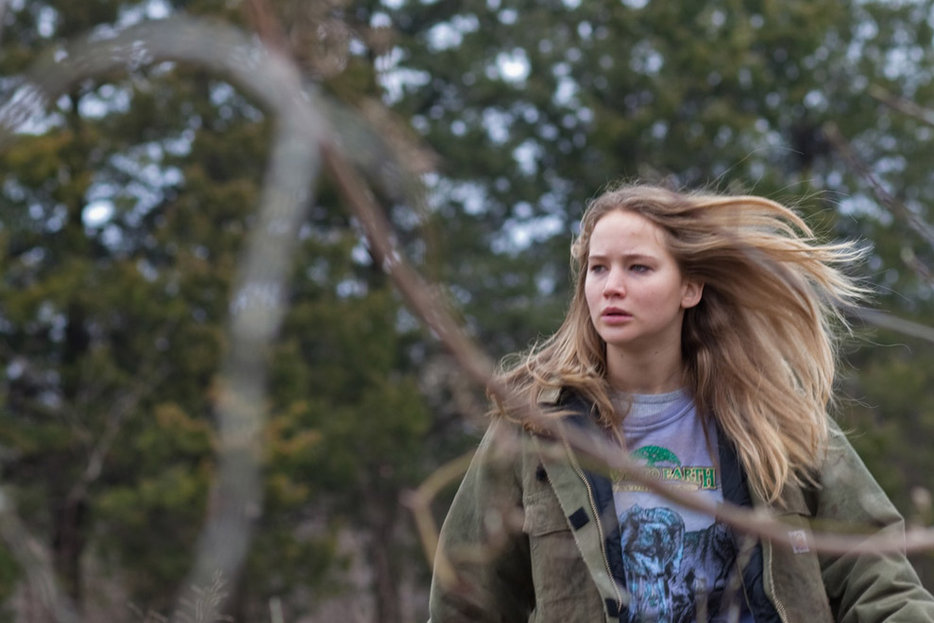Debra Granik
30. Winter’s Bone, directed by
Debra Granik
Screwed Over By The Man
By Rose Marel
Ree’s Daddy’s been a missin’ for round two weeks now, and she wouldn’t really give a rat’s ass, that is ‘til the Sheriff comes knockin’ with some bad news. Looks like Daddy’s in real strife this time, and he’s registered the family home for bail, meanin’ if he’s a no-show at the trial then Ree, her Momma and two kid siblings will be without a roof ‘bove their heads, plain an’ simple. Well, one thing’s for damn fine sure, an’ that’s that Ree won’t go down without one heck of a fight. She’s gon’ find Daddy and drag him to the Sheriff’s door, kickin’ and screamin’.
What else is damn fine sure is that the mountains of rural Missouri are harsh even under regular circumstances. It’s remote and simple, demanding hard work in exchange for life’s basic necessities. The people have to be tough, fortified in their daily wrestle with life. The winter’s not only cold, but it makes life even harsher as survival becomes harder. It’s bleak.
We sense this bleakness immediately through the shadowy texture of the film as it washes over every scene, almost blurring the images, seeming to emit a coldness from the screen. Everything is dark – the clothes, the architecture, the skeletal, jagged trees – and it inundates us with the depressingly desolate imagery of their world. But for seventeen-year-old Ree (Jennifer Lawrence), these cruel conditions are merely the backdrop to her substantially greater familial and economic challenges.
This dim tonality reinforces the gritty thematic tone and underlines the hardship of their living. The music, too, is scarce and fragmented, appearing only sporadically during tense moments. More than music, heavy foley sound effects of wind and barking dogs once again encompass us in the harsh rural surroundings. There’s nothing glossy or bright about their living, and this leaks into the people who live there. As Ree searches for her father, she ventures further into the social landscape, which proves itself to be just as rough as the physical.
Addiction is rampant and so are harsh attitudes. People from these parts seem unafraid to thrown their weight around, whether verbally or literally. Everyone is some sort of distant relative, but here blood is no thicker than water, with the town rooted in oldschool patriarchal values. Even the women readily conform to their place and partner. As Ree rocks up to yet another home asking about her father, one of the women asks: “Ain’t you got no man who can do this?”
It appears to be a society unconcerned with consequences. Violence, vandalism and threats are dished out and flaunted as a way of life. Moreover, every character seems questionable, which makes for an uneasiness that persists throughout the entire film. Reputation is important here, but people are more concerned with destroying stories in which they didn’t shoot their adversary. And if they know something about Ree’s dad, they sure as hell aren’t letting it slipping. It’s within this context that Ree has been formed, and she seems to run on the primal instincts of survival rather than the selfish pursuit of happiness.
There’s no sympathy seeking, however, as Granik establishes Ree as the adult figure in her fractured family. Her mother is catatonically ill and can provide no help in undertaking the regular domestic chores, nor can she offer any kind of maternal support. This is all told matter-of-factly, in a similar fashion to Ree herself, who accepts who she has to be and what she has to bear. The entire film is grounded in realism, with uncluttered storytelling and completely honest performances.

This frank style compliments Jennifer Lawrence’s skills to perfection and, when it was released, the film generated indie buzz and became the catalyst for her soaring career trajectory. Her breakout role led to her first Oscar nomination – her second, two years later in 2013 was her first Oscar win for Silver Linings Playbook – and Hollywood’s instant obsession with J.Law was ignited. As Ree, Lawrence is brilliant, delivering a devastatingly believable mix of strength and fire, tempered by a hidden fragility that’s only revealed in private or unexpected moments. At other times, Ree is like a shark, unflinching and single-minded in her determination. This makes those cracks that appear even more startling, and even more riveting to watch.
Like a great, tragic song, Winter’s Bone escalates in pace and tension, in a gradual but decisive accelerando. It builds, layer upon layer in a mounting of secrets and danger. Nothing is predictable, and in this way nothing or nobody is safe. Granik’s film is a sustained slowburn of suspense that stems from such a definitive vision that it immerses us completely. This is undeniably Ree’s story and we’re just dragged along in her bold pursuit. But, when secrets are consciously buried, it takes stamina and iron-will to unearth them. More than that, it means courage to come up against the forces that made them, and the nerve to face whatever it is that may be found.
One Reply to “30. Winter’s Bone, directed by
Debra Granik”